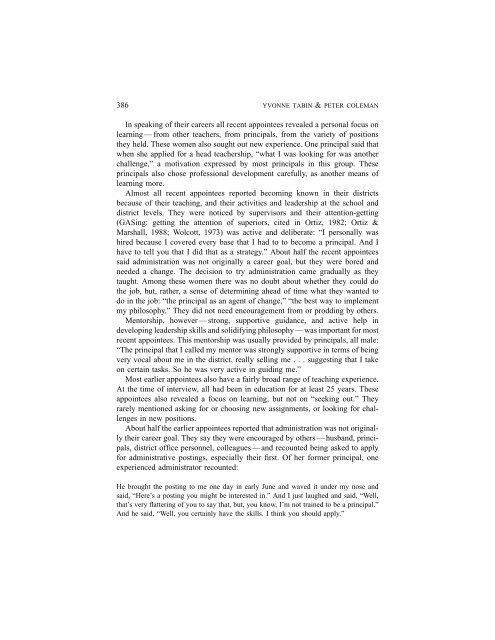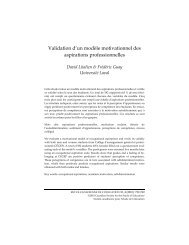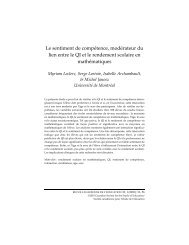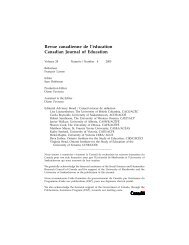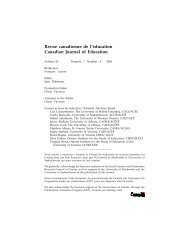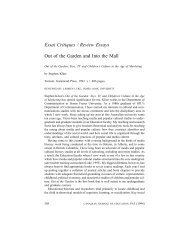Mireille Falardeau et Michel Loranger Le choix de stratégies ... - CSSE
Mireille Falardeau et Michel Loranger Le choix de stratégies ... - CSSE
Mireille Falardeau et Michel Loranger Le choix de stratégies ... - CSSE
Create successful ePaper yourself
Turn your PDF publications into a flip-book with our unique Google optimized e-Paper software.
386 YVONNE TABIN & PETER COLEMAN<br />
In speaking of their careers all recent appointees revealed a personal focus on<br />
learning — from other teachers, from principals, from the vari<strong>et</strong>y of positions<br />
they held. These women also sought out new experience. One principal said that<br />
when she applied for a head teachership, “what I was looking for was another<br />
challenge,” a motivation expressed by most principals in this group. These<br />
principals also chose professional <strong>de</strong>velopment carefully, as another means of<br />
learning more.<br />
Almost all recent appointees reported becoming known in their districts<br />
because of their teaching, and their activities and lea<strong>de</strong>rship at the school and<br />
district levels. They were noticed by supervisors and their attention-g<strong>et</strong>ting<br />
(GASing: g<strong>et</strong>ting the attention of superiors, cited in Ortiz, 1982; Ortiz &<br />
Marshall, 1988; Wolcott, 1973) was active and <strong>de</strong>liberate: “I personally was<br />
hired because I covered every base that I had to to become a principal. And I<br />
have to tell you that I did that as a strategy.” About half the recent appointees<br />
said administration was not originally a career goal, but they were bored and<br />
nee<strong>de</strong>d a change. The <strong>de</strong>cision to try administration came gradually as they<br />
taught. Among these women there was no doubt about wh<strong>et</strong>her they could do<br />
the job, but, rather, a sense of d<strong>et</strong>ermining ahead of time what they wanted to<br />
do in the job: “the principal as an agent of change,” “the best way to implement<br />
my philosophy.” They did not need encouragement from or prodding by others.<br />
Mentorship, however — strong, supportive guidance, and active help in<br />
<strong>de</strong>veloping lea<strong>de</strong>rship skills and solidifying philosophy — was important for most<br />
recent appointees. This mentorship was usually provi<strong>de</strong>d by principals, all male:<br />
“The principal that I called my mentor was strongly supportive in terms of being<br />
very vocal about me in the district, really selling me ...suggesting that I take<br />
on certain tasks. So he was very active in guiding me.”<br />
Most earlier appointees also have a fairly broad range of teaching experience.<br />
At the time of interview, all had been in education for at least 25 years. These<br />
appointees also revealed a focus on learning, but not on “seeking out.” They<br />
rarely mentioned asking for or choosing new assignments, or looking for challenges<br />
in new positions.<br />
About half the earlier appointees reported that administration was not originally<br />
their career goal. They say they were encouraged by others — husband, principals,<br />
district office personnel, colleagues — and recounted being asked to apply<br />
for administrative postings, especially their first. Of her former principal, one<br />
experienced administrator recounted:<br />
He brought the posting to me one day in early June and waved it un<strong>de</strong>r my nose and<br />
said, “Here’s a posting you might be interested in.” And I just laughed and said, “Well,<br />
that’s very flattering of you to say that, but, you know, I’m not trained to be a principal.”<br />
And he said, “Well, you certainly have the skills. I think you should apply.”


